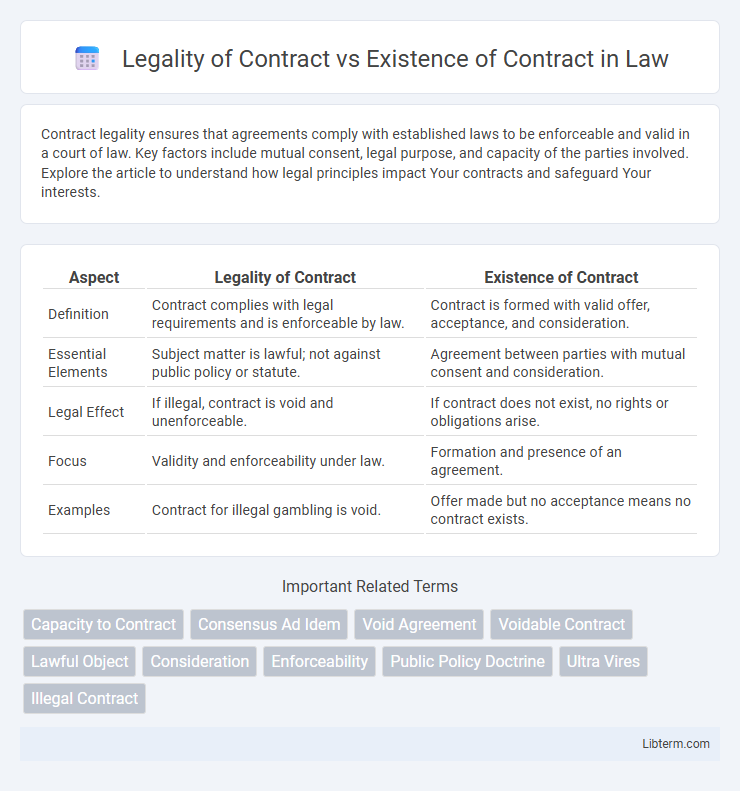Contract legality ensures that agreements comply with established laws to be enforceable and valid in a court of law. Key factors include mutual consent, legal purpose, and capacity of the parties involved. Explore the article to understand how legal principles impact Your contracts and safeguard Your interests.
Table of Comparison
| Aspect | Legality of Contract | Existence of Contract |
|---|---|---|
| Definition | Contract complies with legal requirements and is enforceable by law. | Contract is formed with valid offer, acceptance, and consideration. |
| Essential Elements | Subject matter is lawful; not against public policy or statute. | Agreement between parties with mutual consent and consideration. |
| Legal Effect | If illegal, contract is void and unenforceable. | If contract does not exist, no rights or obligations arise. |
| Focus | Validity and enforceability under law. | Formation and presence of an agreement. |
| Examples | Contract for illegal gambling is void. | Offer made but no acceptance means no contract exists. |
Introduction: Understanding Contracts
Contracts must have both legality and existence to be enforceable under law. The existence of a contract requires a valid offer, acceptance, mutual consent, and consideration, establishing the foundational agreement between parties. Legality ensures the contract's purpose complies with statutory laws and public policy, making the agreement lawful and binding.
Definition of Contract Existence
The existence of a contract hinges on the presence of essential elements such as offer, acceptance, intention to create legal relations, and consideration, which collectively form a valid agreement between parties. Legality of contract refers to the requirement that the purpose and terms of the contract must comply with the law and public policy to be enforceable. Without satisfying the definition of contract existence, any discussion on legality becomes moot since no binding agreement is formed.
Definition of Contract Legality
Contract legality refers to the requirement that a contract's purpose and terms comply with the law and public policy, ensuring the agreement is enforceable in a court of law. A contract must involve legal subject matter, lawful consideration, and parties with lawful capacity to be considered valid and legally binding. Without legality, a contract cannot exist or be enforced, distinguishing the concept of contract legality from merely the existence of a contract.
Key Differences between Existence and Legality
The legality of a contract refers to whether the contract's terms and purpose comply with the law, making it enforceable, while the existence of a contract centers on whether all essential elements--offer, acceptance, consideration, and intention--are present to form a valid agreement. A contract may exist but be illegal if it involves unlawful activities, rendering it void and unenforceable. Key differences include that existence determines if a contract is validly formed, whereas legality assesses its conformity with statutory and public policy requirements.
Essential Elements for Contract Existence
The existence of a contract requires the essential elements of offer, acceptance, consideration, and mutual consent, ensuring both parties agree to the same terms with lawful intent. Legality of contract focuses on the lawful purpose and compliance with statutory requirements, without which a contract, though existent, may be deemed void or unenforceable. Understanding the distinction highlights that a contract's existence depends on fundamental elements, while legality determines its enforceability under the law.
Legal Requirements for a Valid Contract
The legality of a contract ensures that the agreement complies with statutory laws and public policy, which is essential for enforceability. Existence of a contract requires mutual consent, offer and acceptance, consideration, and the intention to create legal relations. These legal requirements form the foundation of a valid contract, distinguishing it from mere agreements lacking enforceability.
Scenarios: Existing but Illegal Contracts
Contracts that exist but are illegal lack enforceability due to violation of laws or public policy, such as agreements involving fraud, illegal trade, or prohibited activities. Courts generally refuse to enforce these contracts, emphasizing the principle that unlawful contracts undermine legal integrity and public welfare. Parties involved in illegal contracts cannot seek judicial remedy, rendering such agreements null despite their initial formation.
Legal Consequences of Illegal Contracts
Contracts that are illegal or violate statutory provisions are considered void and unenforceable, negating any legal obligations between parties. Illegal contracts often result in no remedies for breach, and courts typically refuse to assist either party to prevent encouraging unlawful behavior. The existence of a contract does not validate its legality; legal consequences arise only when an agreement complies with the law, reinforcing the principle that legality is a fundamental requirement for enforceability.
Case Studies: Legality vs Existence
Case studies such as *Carlill v Carbolic Smoke Ball Co* highlight the distinction between the existence and legality of contracts by demonstrating that a contract must first be validly formed before its terms can be legally enforceable. In *Everett v Williams*, the court emphasized that an agreement lacking legality remains unenforceable despite the presence of mutual consent, illustrating that legality is fundamental to contractual validity. These cases collectively underscore that the existence of a contract hinges on mutual assent and consideration, while legality ensures that the contract complies with statutory requirements and public policy.
Conclusion: Ensuring Both Existence and Legality
Ensuring both the existence and legality of a contract is essential for enforceability in legal disputes. A valid contract must fulfill fundamental criteria such as offer, acceptance, and consideration, while also complying with statutory regulations and public policy. Without the simultaneous presence of a lawful purpose and clear mutual agreement, a contract may be deemed void or unenforceable, undermining its legal validity.
Legality of Contract Infographic

 libterm.com
libterm.com